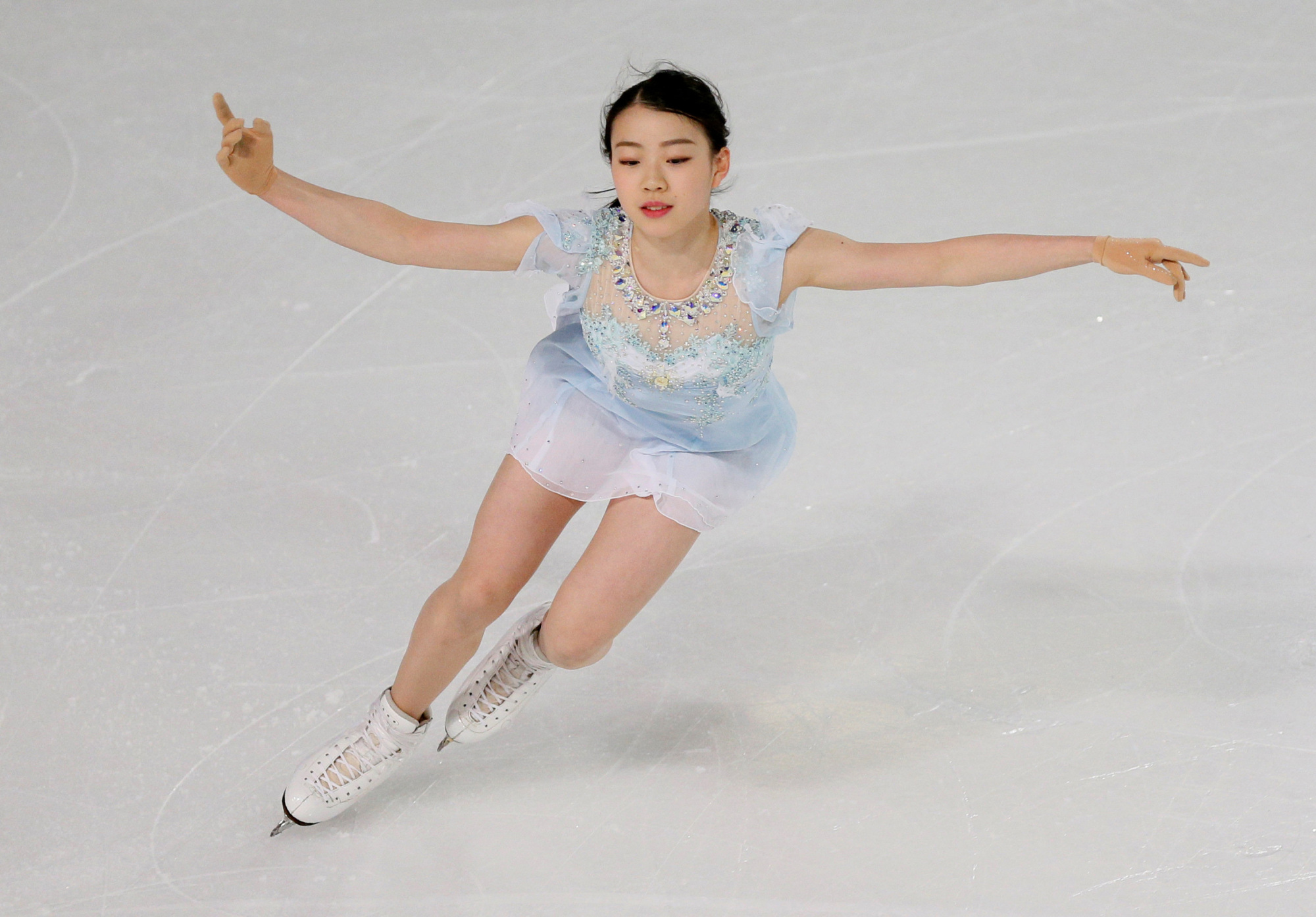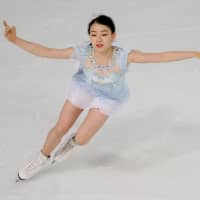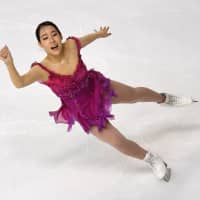Rika Kihira staked her claim as Japan's biggest female skating star with a victory at the Internationaux de France in Grenoble on Saturday night. The triumph clinched a spot in next month's Grand Prix Final for the 16-year-old.
Two weeks after winning the NHK Trophy in Hiroshima in decisive fashion, Kihira eked out a narrow win over compatriot Mai Mihara, despite landing just one triple axel (and under-rotating it) in the competition.
Kihira's winning total was 205.92 points, while Mihara tallied 202.81. The result means that Kihira will be joined at the GP Final in Vancouver, British Columbia, by Satoko Miyahara and Kaori Sakamoto, while Mihara will be the first alternate.
The other three skaters are all Russian — Olympic champion Alina Zagitova, 2015 world champion Elizaveta Tuktamysheva and Sofia Samodurova.
Had the results in France been reversed, all four Japanese women would have qualified for the GP Final. As it is, this marks the first time in eight years that three Japanese women have qualified for the GP Final in the same season.
The last time this occurred was back in 2010, when Miki Ando, Kanako Murakami and Akiko Suzuki all made the cut for the event in Beijing.
Kihira singled her planned opening triple axel in her short program to "Clair de Lune," meaning she received no credit at all. Despite this fact, Kihira still was in second place with 67.64, behind Mihara (67.95), heading into the free skate.
Kihira's habit of popping her opening triple axel in the short program has now become a pattern, as she has done it in both GPs this season, as well as at the Japan Junior Championships last season. It's worth noting, however, that in all three cases she came back to win the competitions.
Eurosport's Mark Hanretty thought the pressure of expectations surrounding the triple axel may have gotten to Kihira.
"There was so much understandable hype and excitement over these phenomenal triple axels that she performed when she competed at the NHK Trophy, she must have felt that pressure," Hanretty stated.
The next comment from Hanretty was really interesting, as he said that he liked Marin Honda's skating better than Kihira's.
"I totally prefer Honda. I prefer choreographically what she did, the performance and the interpretation that Honda gives," he commented while analyzing Kihira's short program. "But it looks to me like Rika is really well trained. Everything looks really polished and really committed."
Despite only attempting the one triple axel in the free skate, Kihira impressed Eurosport's Simon Reed and Louise Walden.
"That was brilliant," Reed said after Kihira finished. "What a talent we have here. She could even beat Zagitova."
Ice Time agrees, but believes Kihira will have to cleanly land three triple axels to defeat Zagitova at the GP Final or world championships.
"That really was fantastic from start to finish," stated Walden. "You could almost see her mindset. She was so focused. She knew what she had to do."
Kihira struggled with the time change and jet lag after arriving in France.
"Considering that I couldn't condition my body well, I did what I could do," Kihira was quoted as saying by the ISU website. "I'm happy about my victory, but I'm not satisfied with my performance and my score, and I hope to do better in the Grand Prix Final."
Near miss for Mihara
Mihara's close loss to Kihira was costly for the 19-year-old, who wept after her free skate score was posted in France and she temporarily moved into first place.
You can't help but feel for Mihara, who is a beautiful skater and a lovely person. She was put in a difficult situation when she was assigned to the NHK Trophy along with Kihira and Miyahara. Had she been sent to another GP, the chances of her making the GP Final may have been much greater.
With the Japan's women having such a deep pool of talent now, Ice Time is getting the sinking feeling that Mihara could be this generation's Yukari Nakano, who twice just missed out on making the Olympic team. Hopefully this won't be the case.
Hanretty thinks Mihara displayed greater facial expressions after completing her jumping passes.
"With each jump landing there was almost a visible sigh of relief, and she seemed to relax as she went into the program and we started to get a bit more expression after this jump landing (a triple flip)," Hanretty remarked after Mihara's short program to "It's Magic."
While not effusive in his praise, Hanretty did note Mihara's elegance.
"She does have a very delicate and soft knee action," Hanretty commented. "Not spectacular, not special, not outstanding, but a clean performance."
Reed admired Mihara's poise in her free skate to "The Mission" with so much on the line.
"Under the pressure she was under, that was a considerable performance," Reed stated.
Walden felt Mihara became fatigued in the latter half of the program and could have been more emotive.
"Technically, for the most part, she was flawless," Walden said. "Toward the second half of the program once again we saw her tire, and if I'm being picky, I would have liked to have seen more expression. Not just through the body, but facially and with extension and the action."
Mihara admitted she had a case of the jitters before her free skate.
"Today I am not satisfied with my free skating. Before I skated I almost burst into tears, but my coach told me, 'Don't worry, I'm here with you' and that was a relief," Mihara commented. "Overall it was a good experience for me and I will continue to practice to gain more confidence."
Honda a non-factor again
Marin Honda (188.61) ended up in sixth place in Grenoble after coming in fourth in the short program. Multiple mistakes in her free skate took her out of medal contention.
The 17-year-old doubled her planned triple salchow, then under-rotated three jumps (triple loop, double toe loop and a double loop) in an uneven performance.
Honda has now skated in four GPs as a senior and never placed higher than fifth (which she did twice last season). She was eighth at Skate America last month in her first GP assignment this season.
Coach Rafael Arutunian said in an interview last week that Honda "is using only 30 percent of the talent she has." While some might agree with his assessment, the real question is how will he get the other 70 percent out of her?
I'm reminded of what Arutunian told me during an interview in May. "Whenever anybody comes to me, I say to them, 'Can you give me some time? I'm not a magician.' "
Yokoi, Tsuboi top juniors
Yuhana Yokoi and Tatsuya Tsuboi won the singles crowns at the Japan Junior Championships in Fukuoka on Sunday. The pair made it a sweep of the titles for Chukyo University High School in Aichi Prefecture.
Though the event lacked the star power of last year with Kihira and Mako Yamashita battling it out, the skaters still put on a good show for the fans attending at Accion Fukuoka.
Yokoi, an 18-year-old from Nagoya, prevailed with a total score of 181.84 points, while Tsuboi triumphed with a tally of 222.79.
Yokoi's classmate Nana Araki was second with 170.90, while Tomoe Kawabata took third on 158.16. The result marked a progression for both Araki, who was third last year, and Kawabata, who came in sixth in 2017.
Three of the skaters in the final group of six women were from Chukyo University High School (Yokoi, Araki, Chisato Uramatsu — who finished 14th). Araki told Ice Time she was really pleased about this.
"It was really wonderful that my schoolmates and I could be together in the final group," Araki stated. "I'm especially happy for Yuhana to be on the top of the podium."
Jumping sensation Shun Sato landed a quad toe loop in his free skate and came in second with 222.30, while Koshiro Shimada finished third at 210.03.
Sato, a 14-year-old Sendai native, received a significant amount of media attention prior to the event and came back to win the free skate after placing sixth in the short program.
It is clear that Sato's raw talent gives him big potential. It will be interesting to see whether it is refined in Japan or with a coach overseas.


















With your current subscription plan you can comment on stories. However, before writing your first comment, please create a display name in the Profile section of your subscriber account page.